by Nonie | Oct 14, 2015
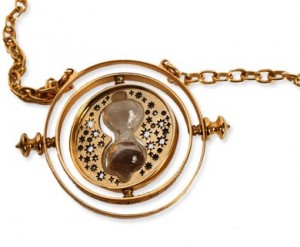
Time turner, Credit: Harry Potter Wikia
Sometimes I wish I were Hermione Granger in my third year of Hogwarts so I could use a time turner! Then I remember I can stream lectures at 2X and gleefully embrace the magic of technology. I may not be trying to save Buckbeak this week, but it sure has been a busy one of amazement, clarity, and immersion in cardiology.
Amazement
I am thankful to specialty interest groups for spurring moments of amazement this week. On Monday, for the first time I had the opportunity to use a fetal doppler to listen to fetal heart sounds. It was absolutely incredible to move the machine over the patient’s uterus and get it just right so I could clearly hear the “lub dub” of the baby’s heart beat: 147 beats per minute! So fast! I don’t think I will forget that moment. In this experience, through the Family Medicine Interest Group’s prenatal shadowing program, I’m paired with one pregnant patient for the duration of her prenatal appointments and delivery. I am so grateful to the patient for allowing me this window into her life!
Last night, pre-clinical students had a chance to conduct physical exams on pediatric patients through the Pediatrics Student Interest Group (PSIG). Our patients were the bubbly, adorable, and healthy kids of several pediatricians. I LOVED being with the kids and trying to assess factors like heart sounds, lung sounds, muscle tone, and reflexes while they were squirming and running around. Kids pose a very different set of challenges compared to adults, and it’s fun to get on my patient’s level.
Clarity
Over the past week, I have also been exploring integrative medicine, which is its own specialty and can also be applied to any medical practice. Over a Juicy Kitchen dinner, we talked about how meditation, yoga, and nutrition can help physicians in their quest for the mindful treatment of illness and for the wellness of providers as well.
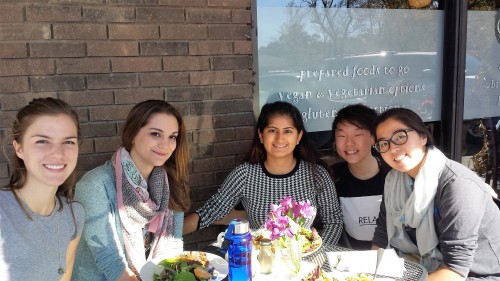
Of course, this led to a Juicy Kitchen brunch with a few of my favorite M1 ladies that Sunday!
Through the same group, I also took a Thai massage class on Sunday. The centeredness and mental clarity I experienced afterwards was wonderful. I now also have many willing practice subjects for these new-found skills.
Immersion
In the classroom, M1s have been focused on cardiology. I’m starting to learn which subjects hold my attention best, such as embryology and pathophysiology. I’m also realizing which parts I need to work harder to engage myself to learn. I love when we form connections between different types of material, and I’m finding those links much more in this sequence than the previous one.
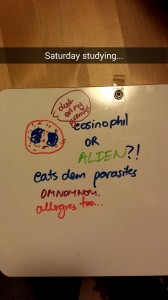
One such Saturday doodle
Although I’m an extrovert by nature, I find it incredibly peaceful to sit with my markers and whiteboard and doodle out the material we are learning. (It’s a good thing too, because I spent the entire day Saturday doing just that.) Spending a whole day immersed in cardiology was one of the best days of the week!
With the first wave of admissions decisions going out tomorrow, I’m excited to welcome our new colleagues to Michigan! Welcome to the family – we are so happy to have you!
Nonie Arora is a 4th year MD/MBA candidate at the University of Michigan. She is passionate about improving the delivery of healthcare and health policy. She can be followed on Twitter @nonie_arora.
by Nonie | Sep 29, 2015
It’s not until my scrubs started exuding a vaguely chemical scent that I felt like a true medical student.
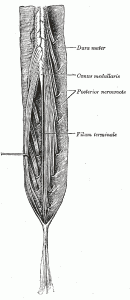
Cauda equina. Credit: Wikipedia
Life lately has been a whirlwind of activity, and I’m excited to catch you up. We started dissecting our cadavers in anatomy lab. The first day, it took me a while to get used to the sights, sounds, and smells, but once we started diving deeper into really learn the structures – especially nerves – I was engrossed.
I’m also a few weeks into my Initial Clinical Experience (ICE). My site, Physical Medicine and Rehabilitation, is very interdisciplinary. So far, I have had the opportunity to shadow the fluoroscopy nurses and the physician. I’ve been impressed by the wealth of knowledge that both groups have as well as their compassion towards patients. It’s one thing to talk about empathy in “Doctoring” class, but another to observe the patience of a physician explaining a condition several times to a patient. It was also incredible to see the cauda equina in anatomy a week after meeting a patient at PM&R being treated with cauda equina syndrome.
We’ve now finished with our first sequence, “Foundations of Molecular Medicine,” and are in a new course called the “Chief Concern.” We’re learning about cognitive errors and biases that interface with clinical decision making. Given my previous experience with behavioral economics, it’s interesting to see how these thinking errors affect medical decision making! It’s also making me realize how physicians often operate in a realm of uncertainty, doing the best that they can with the limited information that we have. (Sounds like M1s taking an exam too, right?)
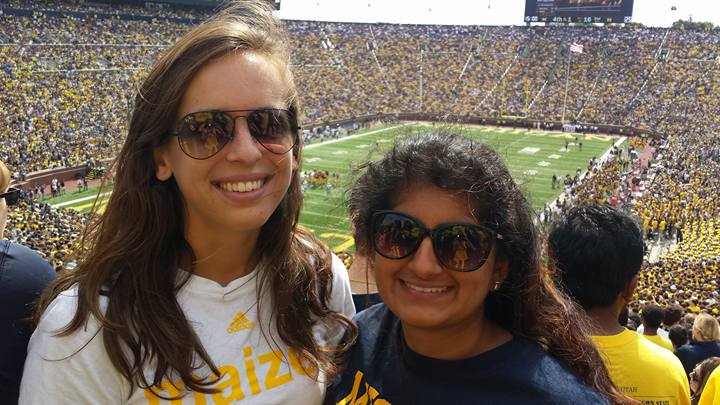
At the Big House!
Outside of school, it’s been a busy and fun few weeks, with a run to the cider mill (fall in #PureMichigan), weekly dinners with family, and an upcoming trip to North Carolina. I also made it to the Big House for a Michigan vs. BYU game (31-0)!
Nonie Arora is a 4th year MD/MBA candidate at the University of Michigan. She is passionate about improving the delivery of healthcare and health policy. She can be followed on Twitter @nonie_arora.
by Nonie | Aug 31, 2015
As I waited patiently to cross at the intersection of Maiden Lane and Fuller on the way to lecture today, I was thinking about how I’ve been obsessed with genetics for a decade. A decade is a drop in the bucket in the scale of evolutionary time, but it’s also close to half my current age. My first inspiration into the world of genetics came from genetic counselor Kelly Ormond in the 7th grade. So you can imagine my excitement that our first M1 lecture of the day was from Dr. Gelehrter on the role of genetics in medicine.
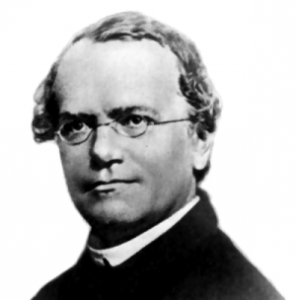
Gregor Mendel, the Father of Modern Genetics (Credit: Wikimedia commons)
Dr. Gelehrter did not disappoint, giving us an overview of Mendelian genetics in a lecture punctuated by a lights-out reading from Mendel and many New Yorker comics. The most engaging part for me was the clinical examples he provided throughout the lecture. Last week genetics was largely about A,T,C,&G’s, promoters, introns, etc., but now it’s about families, progressively developing diseases, and how to alleviate suffering.
While I may not remember all the clinical presentations that were mentioned (yet!), I think I’ll take with me two quotes that Dr. Gelehrter mentioned in lecture today. The first was from Mark Twain:
“It’s not what you don’t know that will hurt you,
It’s what you know for sure that just ain’t so.”
As an M1, it’s clear that there is so much that I don’t know. I’m incredibly humbled by how patients and their families know far more about their diseases than I can fathom. While this may not be scientifically true throughout my career, I’ll have to keep in mind that every patient’s experience is different. They are best able to capture what their disease feels like to them. What are their goals for their care? What are their priorities in life? What I know “for sure” will not apply equally to every case. Keeping that humility throughout my career will serve myself and my patients well.
More food for thought from Dr. Gelehrter:
“There are also unknown unknowns. There are things we don’t know we don’t know.” – Donald Rumsfeld.
While Rumsfeld certainly was not speaking about genetics, the sentiment applies perfectly. (It should be noted that Rumsfeld cites NASA administrator William Graham as the originator of this quote.) Not long ago, we called DNA we didn’t understand “junk DNA,” and now we’re learning how it can contribute to disease. I’ll be keeping an open, curious mind so I can be receptive to those unknown unknowns as they become known. (Say that 5 times fast!)
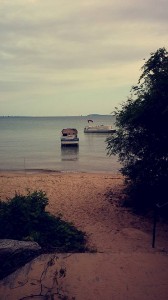
Running by the lake
Overall, I’ve been loving M1 year so far: learning from inspirational faculty and making time for new and old friends. That includes a weekend trip up to Traverse City/ Suttons Bay for the Vineyards to Bay 5k (thank you to flextime quizzing and to my friend Michelle for running with me!).
Next time, I’ll give you an update from our new course, called “Doctoring,” in which our faculty are teaching us how to interview patients and take basic vital signs. I also have my first Initial Clinical Experience (ICE) visit tomorrow at a Physical Medicine and Rehabilitation clinic, and I look forward to telling you all about what it’s like to be part of a inter-professional team. Until next time!
Nonie Arora is a 4th year MD/MBA candidate at the University of Michigan. She is passionate about improving the delivery of healthcare and health policy. She can be followed on Twitter @nonie_arora.







